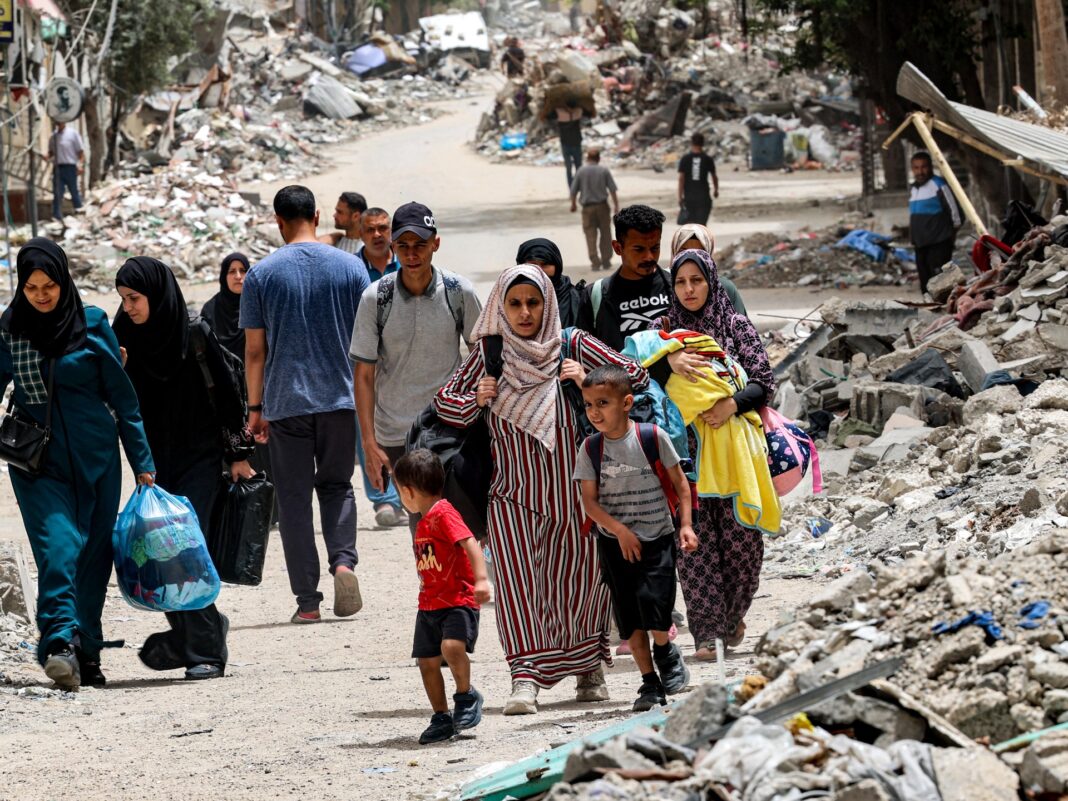The United Nations’ Secretary-General Antonio Guterres has renewed his call for “an immediate humanitarian ceasefire” in the Gaza Strip as Israeli forces have killed more than 35,000 Palestinians in the besieged territory since the attacks began in October, say officials.
In a video address to international donors gathered in Kuwait on Sunday, Guterres also called for “the unconditional release of all captives held by Hamas as well as an immediate surge in humanitarian aid” into Gaza.
“A ceasefire will only be the start,” he said in the video, cautioning that “it will be a long road back from the devastation and trauma of this war”.
As Guterres repeated his plea, Israeli forces hit multiple points in Gaza, displacing anew hundreds of thousands of refugees already fleeing the war. Israeli tanks rolled into Jabalia, while multiple strikes killed dozens of people in Beit Lahiya in the north and Rafah in the south.
Palestinian news agency Wafa reported that at least 12 bodies arrived at Kamal Adwan Hospital in the town of Beit Lahiya following what it described as the Israeli “carpet bombing”.
Emad Oudeh, resident of Beit Lahiya, told Al Jazeera they did not know where to go as Israeli attacks intensified. “We are shocked. We do not know what to do. We are physically and mentally worn out. We are on the verge of going insane.”
Al Jazeera’s Tareq Abu Azzoum, reporting from Deir el-Balah in central Gaza, said Israeli tanks have started “to go deeper” into the Jabalia refugee camp.
Jabalia is the biggest of Gaza’s eight refugee camps and is home to more than 100,000 people, most of them descendants of Palestinians who were driven from towns and villages in what is now Israel during the 1948 Arab-Israeli war that led to the creation of the state of Israel.
“We have been hearing from eyewitnesses on the ground, in that very densely populated area, that military tanks are surrounding evacuation centres and residential buildings,” Abu Azzoum said.
Those fleeing Israeli bombardment also have to contend with an acute shortage of food and medical supplies in areas where they have taken shelter.
Mahmoud Basal of the Palestinian Civil Defence in Gaza said there were no more medical services or humanitarian aid being provided to displaced people in the northern part of the Strip.
“We have lost 80 percent of our capabilities and no one is responding to the appeals we make to international institutions,” the civil defence spokesman said in a statement.
Imad Abu Zayda, an emergency doctor in Jabalia, told Al Jazeera that most of the injured arriving at his hospital were women and children, describing the situation as dire.
“We are operating with minimum facilities. No light due to the lack of fuel and there’s no medical supplement available as Israel has expanded their operation in the area. We have no oxygen to give to patients,” he said.

‘No safe place in Gaza’
In central Gaza, the civil defence department reported at least two fatalities, a father and son, both doctors, in an Israeli strike in Deir el-Balah on Sunday.
Further south in Rafah, Gaza’s southernmost city along the border with Egypt, the Kuwaiti hospital said it received the bodies of 18 people killed in Israeli strikes over the past 24 hours.

The UN agency for Palestinian refugees, UNRWA, gave a similar estimate of “around 300,000 people” who have fled Rafah over the past week, decrying in a post on X the “forced and inhumane displacement of Palestinians” who have “nowhere safe to go” in Gaza.
Palestinians in Rafah, many of them displaced by the fighting elsewhere in the territory, piled water tanks, mattresses and other belongings onto vehicles and prepared to flee again.
“The artillery shelling didn’t stop at all” for several days, said Mohammed Hamad, 24, who has left eastern Rafah for the city’s west. “There is no safe place in Gaza where we can take refuge.”
Residents were told to go to the “humanitarian zone” of al-Mawasi, on the coast northwest of Rafah, though aid groups have warned it was not ready for an influx of people.
EU chief Charles Michel, however, said on social media that Rafah civilians were being ordered to “unsafe zones”, denouncing it as “unacceptable”.







